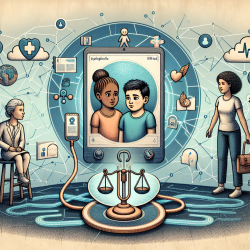Introduction
In today's digital age, cybersecurity is more crucial than ever, especially for organizations like TinyEYE, which provide online therapy services to schools. The recent article, "Comparing Canada’s proposed Critical Cyber Systems Protection Act with cybersecurity legal requirements in the EU," offers valuable insights that can help practitioners in the field of speech-language pathology improve their cybersecurity measures. By understanding and implementing the outcomes of this research, practitioners can enhance their skills and ensure better protection of sensitive data, ultimately leading to improved outcomes for children.
Understanding the Canadian and EU Cybersecurity Frameworks
The research article compares Canada's proposed Critical Cyber Systems Protection Act (CCSPA) with the EU's cybersecurity legal requirements, highlighting several key differences and areas for improvement. The CCSPA aims to regulate critical cyber systems in federally regulated private sectors, but it has been criticized for its patchwork approach to regulation, lack of oversight, and weak penalty schemes. In contrast, the EU's Directive on Security of Network and Information Systems (NIS) and its successor, the NIS2 Directive, provide a more comprehensive and proactive framework for cybersecurity.
Implementing Research Outcomes for Better Cybersecurity
Practitioners can leverage the insights from this research to enhance their cybersecurity practices in several ways:
- Adopt a Proactive Approach: The EU's NIS2 Directive emphasizes a proactive approach to cybersecurity, requiring organizations to implement specific security measures and continuously assess risks. Practitioners can adopt similar strategies by regularly reviewing and updating their cybersecurity protocols.
- Enhance Oversight and Accountability: The research highlights the importance of robust oversight and accountability mechanisms. Practitioners can improve their cybersecurity posture by establishing clear roles and responsibilities for cybersecurity management and ensuring regular audits and assessments.
- Focus on Deterrence: The CCSPA's penalty scheme focuses on compliance rather than deterrence. Practitioners can strengthen their cybersecurity measures by implementing deterrent strategies, such as robust access controls and regular security training for staff.
Encouraging Further Research and Collaboration
While the research provides valuable insights, it also underscores the need for ongoing research and collaboration in the field of cybersecurity. Practitioners are encouraged to stay informed about the latest developments in cybersecurity regulations and best practices, both in Canada and the EU. By participating in professional networks and collaborating with peers, practitioners can share knowledge and resources to enhance their cybersecurity measures.
Conclusion
By implementing the outcomes of the research on cybersecurity frameworks, practitioners in speech-language pathology can improve their skills and ensure better protection of sensitive data. This, in turn, leads to improved outcomes for children receiving online therapy services. To read the original research paper, please follow this link: Comparing Canada’s proposed Critical Cyber Systems Protection Act with cybersecurity legal requirements in the EU.










